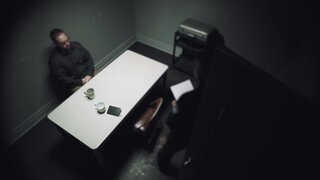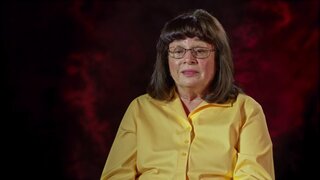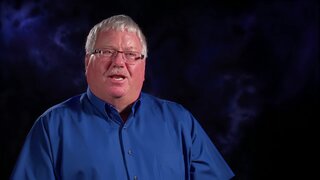Create a free profile to get unlimited access to exclusive videos, breaking news, sweepstakes, and more!
How An Iowa Mother's Killer Nearly Got Away With It
Pastor's wife Cynthia Borton was found murdered in her own kitchen in 1988. Who killed her, and why?
For John Borton, September 6, 1988 would be the worst day of his life.
“I saw an ambulance parked in front of my house and my father was leaning against the front of my mother’s car crying,” John Borton, who was 18 at the time, told “An Unexpected Killer,” airing Fridays at 8/7c on Oxygen. “And I just knew, deep down inside me, that my world was never going to be the same."
John's mother, 39-year-old Cynthia Borton, lay dead inside the family's house in Shenandoah, Iowa.
John's father, local pastor Robert Borton — then 43 — had come home around 3:30 p.m. to check on his wife after her boss had called to tell him she didn't show up at work. When he got there, he found Cynthia lying in a pool of her own blood with a carving fork stuck in her neck.
"There was a lot of blood everywhere," Iowa Department of Criminal Investigation special agent Mel McCleary told "An Unexpected Killer." "This person had been stabbed many, many times."
Lying around Cynthia's lifeless body were two knives, a four-pronged roast-lifting fork, and the home's phone, which had been torn out of the wall. All but the phone appeared to have been used in her murder.
Police already had suspicions about who might have done it
“There was no forced entry,” Shenandoah Police Chief Richard Hunt told "An Unexpected Killer." “We were 99 percent certain that she knew who the perpetrator was. My first thought was that it was a family assault.”
Robert explained to police that he'd gone to his part-time job at a local car dealership that morning and came home for lunch with his wife at noon, which was part of their routine. She'd served spaghetti, and he went back to the dealership at 1:00. Cynthia's boss called just after 2:00 p.m., as Cynthia failed to show up for work; Robert told the man he believed his wife had simply overslept during an afternoon nap and would be there soon.
But when it got to be after 3:00 and Cynthia still hadn't come in, her boss called Robert back and Robert rushed home to discover his wife's body.
“Bob really did have a very strange personality and strange mannerisms about him when he was interviewed,” said McCleary. “He didn’t really show any signs of grieving. You would’ve expected that a man, having just lost his wife, would be very emotional at the time he was being interviewed. We didn’t see that with Bob Borton.”
Police tried to assess the state of the couple's nearly 20-year marriage. At the station, Borton told them they had arguments, but was "in kind of a defensive mode about the questions," according to Hunt.
“His stoic but unemotional denials only increased their suspicion,” said Thomas Miller, a prosecutor with Iowa Attorney General’s Office.
In the meantime, investigators had been talking to the neighbors about what they might have witnessed that afternoon; one said that he’d seen a teenager running away from the home and described someone not unlike John Borton.
When John went to the police station for a more formal interview the following day, he felt the police were suddenly suspicious of him.
“The whole tone of the investigation changed,” said John. “They were considering me personally to be a suspect. Who on earth could think that I would do this to my mother?”
He told them his mother was "his world" but admitted the two had argued the morning of her murder.
John said he was in school all day, but didn’t have any classes from noon until three ... which gave investigators another alibi to verify.
So first, they interviewed his friends Jim Bettis and John Jackson. Neither could confirm his alibi, but both said there was no way John had done it.
“Friends of John Borton said Cynthia Borton’s murder had been true devastation for John,” said McCleary.
Teachers were also questioned about his alibi and were able to confirm he’d spent the entire day in school. John, it was determined, was no longer a suspect.
Three days later, police got the autopsy report back.
“Cynthia suffered a horrifying death,” said Miller. “The medical examiner found that Cynthia had been stabbed 29 times with at least four different instruments: two knives and two serving forks. In addition to stab wounds that directly led to her death by puncturing vital organs, she had defensive wounds on her hands and forearms.”
Robert got called back in for questioning, and investigators spent three hours interrogating him even harder, which Robert described to the Des Moines Register in 1990.
"I sat down and Pontious took a chair real close to me," he told the paper of his interview with DCI agent Robert Pontious. "I'll never forget. Pontious looked at me and said, 'Bob, let's quit playing games. We both know Cindy was dead when you went back to work.'"
Robert held firm that he had not killed his wife.
"Every time I would answer, 'I don't know' or 'I didn't do it' he would get angrier," Robert added. "Finally, he took his jacket, rolled it up, threw it on the desk and doubled up his fist, swore at me and told me, 'We're going to get to the bottom of this. We're going to take you to Des Moines and give you a lie-detector test. We'll find out if you're telling the truth.'"
They called McCleary to do a polygraph, and drove Robert to Des Moines the next day to do it. And when Robert failed that polygraph, McCleary interrogated him over it.
“When I confronted him with the results of his polygraph examination, he didn’t shake his head no, that he didn’t do it, he didn’t try to respond to me in any way, shape or form, he basically just sat in the chair and didn’t move,” said McCleary. “The only thing I wanted him to say was, ‘I did it,’ and so we were very aggressive in interrogating Bob Borton about his wife’s murder.”
It didn't work.
“Robert Borton never wavered in his denial that he was responsible for this,” said Miller.
The police still had their suspicions, though... as did the people of Shenandoah, Iowa.
“We wanted to get this case cleared up so gossip and things would die down,” Hunt told "An Unexpected Killer."
After burying Cynthia and coping with the fallout from being suspected in her murder, the remaining members of the Borton family moved out of town in November.
“It was unbearable for my father to continue to live there,” John. “People who he thought had been friends before had shut him out.”
Two and a half months after Cynthia's murder — and shortly after Robert and John left town — local police received the results of the fingerprint analysis from the state crime lab.
“Robert’s fingerprints were not found on any of the murder weapons or the phone,” said Miller. “This, frankly, was frustrating to some of the investigators involved in the case. It was solid evidence that someone other than Robert Borton was very possibly the guilty party in this murder.”
But investigators were still stymied.
“In the weeks preceding and following the murder of Cindy Borton, there were arsons in the town of Shenandoah,” said Miller. “Even though arson is a different crime from murder, it’s a violent crime and when one has a series of violent crimes — in this case, arsons and a murder — all occurring in a matter of weeks, it would be only normal to at least examine the possibility of a connection between the two.”
Then, on Nov. 30, 1988, there was another attempted arson — at Shenandoah City Hall — and a new clue in the Borton case. The arsonist left a note.
The note said: “Compliments of Night Stalker.” And then it had a list of crimes: “Broad Street,” referring to an arson at the school, “Anderson pickup,” referring to a school teacher’s pickup which had been set on fire, and “And Cyndi Borton” with Borton underlined.
“The note in question was signed ‘the Night Stalker’ — N.S. — that copied the name of a highly publicized murderer in California,” said Miller. (The original man who used the moniker had, at the time, already been arrested.)
Police found a fingerprint on the final note and sent it to the crime lab, but it didn’t match anyone in their database.
However, they got a break in all four cases on Jan. 31, 1989.
“A young man named Jackson, a high school student, came into the police department and informed authorities the previous day he’d had a visit from a friend, another teenager, and that in the course of their afternoon visiting with each other this friend had told him that he had some very shocking information, and something that was bothering him,” said Miller. “More specifically, that he had murdered Cyndi Borton.”
John Jackson named that friend as Jim Bettis.
“Jim Bettis was a close friend of John Borton's,” said Miller. “They were classmates until Jimmy dropped out of high school. He was close enough to John and interacted with the Bortons so much that Cindy was very involved in Jim’s life, even thought of Cindy as a second mother to him.”
But despite the unlikeliness of the new suspect, the evidence began stacking up against him quickly.
“[Bettis] described the murder that he had committed, and even went so far as to draw a small diagram indicating exactly where the body had been left in the house,” said Miller. “Jackson shared this drawing as well with the authorities, which was important and surprising because it appeared quite accurate.”
“He told Jackson, ‘I’m going to show you where the knife is,’” Kevin McAndrews, a reporter with the Daily Nonpareil, told "An Unexpected Killer." "And he did that, and that’s when Jackson realized, ‘Oh, he’s really done this."
Police called Bettis in for another interview, where he admitted to the arsons but denied both committing murder and having confessed to Jackson.
He did, however, let them take his fingerprints and undergo a polygraph ... which he failed. McCleary then confronted Bettis with the results, and he cracked.
“James Bettis told me that, on September 6 of 1988, he was walking around town, he was thinking about his father, he was thinking about how he hated his father,” said McCleary. “He needed to be able to get that rage out. How he was going to do that was by seeing if he could actually kill.”
“His statement was that he wanted to kill his father but that he knew he couldn’t get that job done so he killed someone who was far more vulnerable,” said Miller.
He then went to Cynthia Borton's home, where she let him in.
“During his confession, Jimmy Bettis indicated that he had asked Cindy for a glass of water, which led her to walk into the kitchen,” said Miller. “He followed her there, and approaching her from behind and grabbing a knife, immediately slashed her throat from behind. He stated he had used a pocket knife of his own in addition to Cynthia Borton’s kitchen utensils.”
He said he threw that pocket knife under a bridge. Police eventually found the knife and, with it, Cynthia's blood and Bettis' fingerprint.
Jim Bettis was charged with first-degree murder and three counts of arson on Feb. 2, 1989.
Bettis was convicted at trial and, on Nov. 13, 1989, he was sentenced to life in prison. His appeals failed, and he remains incarcerated at the Clarinda Correctional Facility, which is 20 minutes from Shenandoah.
“My best friend committed this heinous crime of murder against somebody who trusted him, supported him and cared for him,” said John Borton. “He frequently told me that we were brothers forever and I honestly felt the same thing for him. And then for him to turn around and do such a horrific action... there is a bit of relief knowing he won’t ever be out again for the rest of his life.”
For more on this case and others like it, watch "An Unexpected Killer," airing Fridays at 8/7c on Oxygen, or stream episodes here.






















